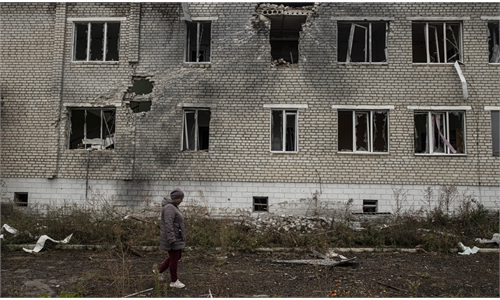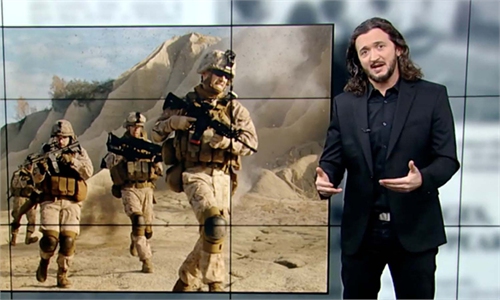A form of sociopathy: US doesn't care even if every Ukrainian dies, says RT America former host Lee Camp
Lee Camp
Editor's Note:The Russia-Ukraine conflict is approaching its one-year mark, with no end in sight. It is eating up scarce European resources, preventing millions of refugees from returning home and weakening the global economic outlook while the US and some European countries are fanning the flames of the war, keeping sending weapons to Ukraine. How will the Russia-Ukraine conflict end? What are the biggest stumbling blocks for negotiation and diplomatic resolution?
In an interview with Global Times (GT) reporter Wang Wenwen, Lee Camp (Camp), a US comedian and former host of RT America which was shut down not long after the conflict started, said that the idea that people have been manipulated to believe that the only way to peace is war is horrifying. "Our mainstream media acts as a conduit for pro-war talking points, because the US really is a war machine," he said. He also accused US politicians of not caring what's going on on the ground in Ukraine, which is "a form of sociopathy."
This is the fourth installment of the series.
GT: When reporting on the Russia-Ukraine war, US mainstream media outlets are propagating their own selective facts and myths, while censoring counterclaims, like what they did to RT. Why do US mainstream media outlets behave like conduits for pro-war propaganda?
Camp: There are a few reasons. There's a famous quote that one of the first casualties of war is the truth. I think we definitely saw that, although I think the truth maybe was pronounced dead before the war began.
But the US corporate media is really an extension of the state corporations that now own our government. They own our politicians. A large Princeton study found that nothing goes through our Congress that doesn't confirm or work with everything corporate America once was. And these mainstream media is all large corporate entities that are all intertwined with large corporate America. So anything said on our mainstream media must work with whatever corporate America wants. And what corporate America wants is, in this case, war, a proxy war in Ukraine between the US and Russia.
I'm opposed to the Russian invasion. But I'm also opposed to the 2014 US-backed coup in Ukraine. I'm opposed to the growth of NATO further onto Russia's borders. You can be opposed to all those things at once. It's called being anti-war. And true anti-war voices are not allowed on our mainstream media in the US.
As you said, our mainstream media acts as a conduit for pro-war talking points, because the US really is a war machine. We spend a trillion dollars, roughly, if you include the black budget on our military every year. That's more than 144 countries combined. 144 countries' military spending around the world does not combine to the amount the US spends in one year. It's truly an unbelievable amount of money with 800 to 900 military bases around the world.
Our economy is wrapped up in war. Our media is wrapped up in war. Our politicians are wrapped up in war. There really is not a minute that goes by that the US is not involved in war, either economic or otherwise, but often actually hot war, meaning missiles and bombs.
GT: One year on, how does the US corporate media's way of reporting affect the American people's perception of the war?
Camp: I think it's quite clear that if you say something enough, the American people believe it, and that goes for pretty much people around the world. A large psychological study found that people confuse familiarity with proof, meaning if they hear something a lot, they will think it's true, even if they knew it wasn't true in the beginning.
That is how American media works. It repeats the same thing over and over again until people start to believe it. And this is despite the fact or even in light of the fact that the mainstream media has been shown to have told great egregious lies over the course of our history, including WMD in Iraq -- the list goes on and on -- smaller ones more recently, the Taliban bounty stories in Afghanistan, Cuba is using acoustic weapons to give US diplomats light headaches, just really dumb garbage. And our mainstream media is proven to have lied about these things. Even when those revelations come out, they still continue to do their job as if it didn't happen, as if those lies weren't revealed.
We should be at a point where no one should believe any of the mainstream media in America. But unfortunately, they continue to operate and obviously they have the money behind them. They have billions and billions of dollars that go into this every year.
GT: In one of your tweets, you said that the ruling elites don't care at all whether the sanctions and the proxy war in Ukraine have boomeranged and harmed average Americans. What harm do the sanctions and proxy war in Ukraine bring to the Americans?
Camp: There's kind of a larger harm in that. It harms cooperation around the world. It harms Americans' views of other countries. The truth is that Americans should be working with Russians and Chinese and should be working with people around the world to solve all of the grave issues that humanity is facing right now. We've got environmental catastrophe, we've got climate crisis, we've got being on the brink of nuclear war. There's a long list of catastrophic scenarios that the people around the globe should be coming together to solve.
But instead, when you create a proxy war, when you create propaganda that says everyone in that country is evil, it means that people can't work together and they can't actually view the reality of the situation. They have to simply just have blinders on and go. Those people are evil, they are bad end of story. So that way it harms Americans.
But then there's kind of the more nitty-gritty on the ground stuff, which is that there's a lot of economic hardship in America and Europe. Some of it, not all of it, is due to this new economic war that is splitting the globe in half. The US has put massive sanctions on Russia. Those sanctions are harming the energy supplies of most of Europe. It's causing inflation in America. These things all have ripple effects because the global economy is intertwined. When you shut off major countries and say we're going to stop you from ever being able to sell your products or to work with us, it obviously ripples around the world.
GT: Why they don't care? What flaws do the sanctions and the proxy war expose about the US system?
Camp: The ruling class in America doesn't care that the average Americans are struggling, that people can't pay their bills and that there's a level of debt we've never seen before in America. They don't care because they are insanely rich. The amount of money that they have is unbelievable. Just during the pandemic, they collected trillions and trillions of more dollars into the pockets of the rich. These things don't impact them. The price of gas doesn't really impact them. The price of groceries doesn't impact them. They don't care about that. In their view, it is a long game to make sure that the US maintains hegemony and our global control. And that's really what they're playing.
There's a lot of flaws there. One of the main ones is it shows how short-term greedy these people are. There's short-term greed and there's long-term greed. Long-term greed could be something like you wanna have a sustainable planet because you want to be able to live and keep having your business if you're a business person.
But short-term greed is we're going to destroy everything we can in order to maintain our control and economic hegemony, hegemony writ large. They don't seem to care that, but in the long term, you have massive trouble for people. You have massive debt, you have massive other dysfunction that results from creating a proxy war. They don't care what's going on actually on the ground in Ukraine. They don't actually care if Ukrainians die. The expression that many people have been using is the US wants to fight Russia to the last Ukrainian. We are willing to have a proxy war with Russia, even if every Ukrainian dies. It doesn't matter to the US ruling elite. And it's a form of sociopathy. It's a sociopathic view of the world to not care about those human beings on the ground.
GT: Will the conflict prompt more anti-imperialist and anti-war voices like you?
Camp: There has been a growth in people that are to some degree anti-imperialist. Especially in the Global South, I think a lot of humanity around the globe is realizing that the way the US does business, which is basically "listen to us or we will destroy you," "do whatever we say or we will destroy you." Most people are waking up to the fact that that is unacceptable and unsustainable.
So you are seeing a lot of people waking up. Some are in America, but many are in Africa and Latin America, people are standing up against this imperialism and colonialism. In Latin America, people are voting for governments that are speaking out against US imperialism. In Africa, you're seeing some of that as well.
I think there's a lot of waking up around the world. One example is that apparently 80 percent of the world's population live in countries that are not supporting the US proxy war in Ukraine, if taking the nations that did not sign on to US sanctions and calculating populations of those countries. That doesn't mean they're all throwing their support behind Russia, but they're basically saying we're staying out of it.
Just a few years ago, the US could pressure a lot of countries around this globe to cave in and say they support whatever the US was standing for, whatever foreign policy we were standing for. But now you have 80 percent of the world's population against the largest foreign policy initiative of the US this year and last year. That's a big deal. That's a lot of the globe population standing up and not willing to just bow down to US hegemony.
GT: Will cognitive warfare become a new normal in future wars?
Camp: In many ways, our US military has been military complex and has been busy with trying to influence minds for many years. Propaganda is nothing new. Propaganda was very prevalent in World War II, and the Nazis were quite good at it. So propaganda is not that new, but in terms of really thinking you can dominate people's minds 100 percent, there's more discussion and thought about that in our military industrial complex than there used to be.
I just recently covered on my show, the most censored news. I covered the NATO panel and NATO report, saying that they viewed cognitive warfare as what may soon become the next domain of war. It's beyond just propaganda, it is a full on social engineering of people so that they will support whatever foreign policy they're told and things like endless war.
And in many ways, they already succeed about that. There are a large percentage of Americans that think the only way to create peace in Ukraine is to send missiles, bombs and tanks.
The idea that people have been manipulated to believe that the only way to peace is war is horrifying. That is a sad state of reality. Because if we're going to achieve peace, if we're gonna have peace in this world ever again, it can't be done with missiles. It has to be done with talking. It has to be done with diplomacy. It has to be done with human beings sitting down and working out our differences. And the US views that as the last resort. The US now has a policy where if anyone sits down to speak to anyone, then that means they've been manipulated or they have given in or they have failed, whereas talking and sorting out our differences diplomatically should be step one. It should be an evolved way of being. It should be a cooperative way of being, and that is the way you achieve peace.
GT: In a recent interview you did with co-founder of Code Pink, you discussed how to make politicians very uncomfortable. So how? Do you think what you and your peers do will make US politicians uncomfortable?
Camp: Our politicians insulate themselves, they try and not to interact with average Americans that often. But they will have events and things and anti-war organizations like Code Pink will often show up and get in the face of these politicians and accuse them of the things they are actually guilty of. Say, why do you support these economic sanctions when people are dying? Why do you support putting more money into the Pentagon when we are bombing so many people? Things like that. And the politicians get very uncomfortable because they don't actually have answers to these questions. They're not used to someone actually being in their space and asking them these questions.
I think it's important for them to see that there are real Americans that care about these issues. But it's also important because people are far more likely to talk about something like that than they are to talk about an online petition or something like that. So it's a form of activism that I think is very important. Americans should step up to our politicians and our media and ask them these questions.
GT: Do you worry about possible suppression against you?
Camp: The suppression continues. It continues every day. My TV show was cancelled, and the same week, my YouTube page, which was one of my biggest platforms, was banned around the world and over 2,000 videos banned around the world, which is basically the digital equivalent of book burning. So they have burned all of my old episodes of Redacted Tonight.
Now I have a new YouTube page. I have a Rumble page and a Facebook page. Most of what I deal with now is just shadow banning and suppression. In the US our social media far more rarely delete something. I know there are many countries in the world where they do delete political content, but what ours normally does in the US is that you think you've put it out there and just no one sees it. I have a large Facebook page, but very few people see my post. So it becomes very similar to deleting. It just doesn't have a big banner that says this has been deleted.
There's a lot of suppression. Unlike many countries, the US claims to have freedom of speech. We claim you can say whatever you want, and that is your freedom. But it's not actually true. You really have to say what is a kind of a certain allowable mix. And if you don't, then they will cover up what's being said. Now luckily, I live in a country where I don't have to fear being arrested for saying these things. But we don't have the freedom of speech that we claim to have.



